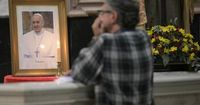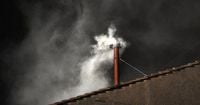In a historic moment for the Catholic Church, the conclave to elect a new pope is currently underway in Rome following the death of Pope Francis on April 21, 2025. This pivotal event marks a significant transition for the Church, as cardinals gather to deliberate and ultimately select the successor to one of the most recognized religious figures in the world.
The conclave began on the morning of May 7, 2025, and is expected to attract global attention as the cardinals vote on the next leader of the Catholic Church. The process, shrouded in tradition and secrecy, has sparked widespread speculation about who will emerge as Francis' successor. Cardinal Jorge Bergoglio, who became Pope Francis in 2013, was largely unknown to the public before his election, highlighting the unpredictable nature of papal selections.
The previous pope's legacy is expected to heavily influence the selection process. Pope Francis was known for his progressive views and efforts to reach out to marginalized communities, a stance that has reshaped the Church's image in contemporary society. His appointments of cardinals who reflect these values suggest that the next pope may continue in a similar direction. Many of the cardinals elevated by Francis are seen as committed to the Church's mission of inclusivity and collaborative decision-making.
As the cardinals gather in the Sistine Chapel, the atmosphere is charged with anticipation. The election of a new pope is not just a matter of choosing a leader; it is a pivotal moment that can redefine the Church's future. Ralph Fiennes’ character in the movie "Conclave" aptly describes the significance of this event, stating, "We’re about to choose the most famous man in the world." While the cardinals might not be seeking a celebrity, they are tasked with selecting a figure who can lead the Church through its current challenges.
The conclave operates under a unique set of rules and traditions, with cardinals voting in secrecy. The process can take days, and the cardinals must reach a two-thirds majority to elect a new pope. Historically, this has led to surprising outcomes, as seen in the selection of John Paul II in 1978, when many were left wondering who he was upon his election.
Experts and observers are keenly watching the dynamics within the College of Cardinals. The political maneuvering that occurs behind closed doors is a critical aspect of the election process, with many predicting that the next pope will be a familiar face to the cardinals themselves, rather than a figure who has captured the public's imagination.
As the world watches, it is essential to remember that the choice of the new pope is not merely a reflection of public sentiment or media speculation. The cardinals believe that the Holy Spirit plays a significant role in guiding their decision. This belief has led to unexpected choices in the past, and many are hopeful that the next pope will bring a fresh perspective to the challenges facing the Church.
In recent years, the Catholic Church has faced numerous issues, including declining attendance, scandals, and the need to address modern social issues. The election of a new pope will be a crucial moment for the Church to reaffirm its values and mission in a rapidly changing world.
The conclave's proceedings are being closely monitored not only by Catholics but also by the broader public, as the implications of the new pope's leadership will extend beyond the Church itself. The next pope will need to navigate complex global issues, including social justice, climate change, and the role of religion in public life.
As the cardinals cast their votes, many are left wondering what the future holds for the Catholic Church. Will the next pope continue the path set by Francis, or will he take a different approach? The answer to this question remains to be seen, but one thing is certain: the world will be watching closely as the conclave unfolds.
In addition to the political and spiritual implications of this election, the conclave also represents a moment of unity for the Church. Cardinals from around the world come together to deliberate on the future of their faith, showcasing the diversity and richness of the Catholic tradition. This gathering serves as a reminder of the global nature of the Church and the shared mission of its leaders.
As the day progresses, the anticipation builds. The announcement of the new pope will be a moment of great significance, not only for the Catholic Church but for millions of believers worldwide. The name that will be called from the balcony of St. Peter’s will signal a new chapter in the Church's history, one that will shape its direction for years to come.
In the coming days, as the conclave continues, the world awaits the decision that will resonate far beyond the walls of the Vatican. The next pope will inherit a legacy of change and challenge, and his leadership will be crucial in addressing the needs of a diverse and evolving global community.


